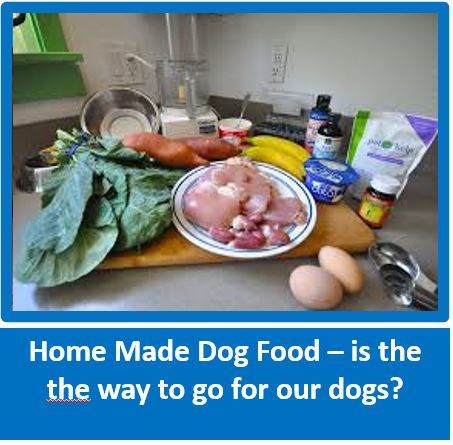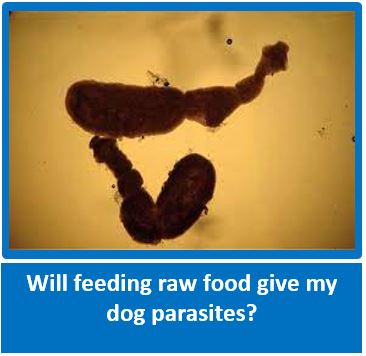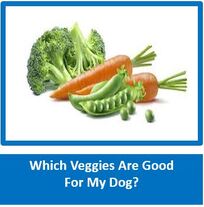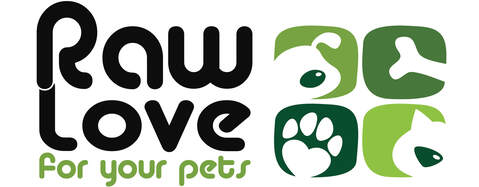
All free-range proteins, no grains, no preservatives. We get the veggies, fruit & supplements from the same shops & farms where we buy our own supplies, including health shops and organic outlets. There are so many benefits to feeding your pups & dogs a diet of fresh, raw food – most important being a healthy immune system. A raw diet also assists with multiple health challenges, including allergies, dry & itchy skin, digestive problems, obesity, constipation and many more – plus it is what dogs were designed to eat – brilliant to give your pup a wonderful start in life. Registered with Dept of Health. Available in Gauteng, Cape Town & Surrounds and KZN. Do have a look at our website at www.rawlovepets.co.za and contact us if you have any questions.
|
Raw Feeding - Does this lead to aggressive behaviour in dogs?
www.bellaandduke.com - this website has some great Blog articles and scientific research on raw feeding - enjoy! |
From - FOTD - Working with aggressive dogs over the years, our findings are that changing to a properly balanced raw diet, combined with the correct behaviour mods, leads to reduced aggression and other excessive behaviours - unfortunately this is not an area that has been studied scientifically. When this research does come to light, we will update you on same.
|
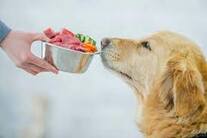
For those of you wondering does raw food make dogs more aggressive? Specifically, the protein levels. Rest assured this is a myth. Our natural canine behaviourist, Caroline Spencer and our vet expert friend Dr Brendan Clarke explain why this is simply not true.
Proteins are the building blocks in our bodies. Natural, healthy and nutritious. Raw food does not make them bloodthirsty or more inclined to chase down wildlife. Let’s explain why.
Does raw food make dogs more aggressive? What the Vet says
Rowan, our Chief Nutritional Officer, asks Dr Brendan to bust the myth does raw food make dogs more aggressive?
Dr Brendan explains that when it comes to aggression in dogs there are lots of factors at play. In his view, you should consider more ‘how’ you feed your dog rather than ‘what’ you feed a dog. How you feed your dog can play an important role in making a dog aggressive.
If you make your dog sit for their meal or feed them somewhere they feel their food will be taken away, they may begin to show signs of food aggression. Learn about our natural canine behaviourists ‘natural feeding method’ in her guide for ‘dogs not eating’.
Dogs thrive on protein and fats for their energy. Not the carbohydrates and preservatives found in highly processed food. Dr Brendan goes on to say that the preservatives, additives and colourants in highly processed food are more likely to make a dog ‘hyper’ than raw dog food.
Some dogs can become aggressive around food
Certainly, some dogs will be more possessive over a delicious raw diet if that’s their nature. They may have had food taken from them as a youngster, (removing food has been suggested by some professionals to prevent food aggression. It promotes it!) had to fight for food as a stray or not had enough food in the past and been starved for days on end.
In this case, you know if your dog is of a possessive nature. When you give food to any dog, step away and face away. Give them no cause to feel it may be taken from them.Those aggressive around food need to enjoy their food as much as the next dog rather than guard it. Be seen to give rather than take or look like you may take by watching as they eat. Then your dog will relax and enjoy his food and respect his personal space.
Does raw food make dogs more aggressive? Look to the carbs, preservatives & additives instead
It is not protein that gets dogs reacting with unruly behaviour. It’s the sugars in the carbohydrates from processed diets plus the additives to preserve the food. The vitamins within processed dog food are not natural and less available to your dog’s system.
People are led to believe that raw food contains very high protein. The percentage of protein found in a raw meal made by Bella & Duke ranges from 12% to 19%.
Meat is not just protein, it contains water 65% to 75% (dependent on the cut of meat and fat content) fat, connective tissue and within those minerals such as phosphorous, calcium zinc and iron.
Invaluable natural vitamins are found in the organs (offal). The bone is built up of collagen (a type of protein) and contains calcium to give the bone strength and flexibility.
The fresh meat, offal and bone are simply minced in the right proportions using great cuts of meat (not the leftovers from human manufacturing meat plants which will be a portion of the poor ingredients for processed foods) then frozen.
All vitamins and minerals and goodness is preserved just as it is. It’s as simple as that. NO adding in vitamins, preservatives or bulking agents like potato or rice as they do for kibble to give the dust some form and nutritional quality.
Why do dogs need protein?
What’s the point of protein? Protein is needed for overall healthy optimal function, to build and repair our organs, muscles, hair, nails, skin and blood.
Protein is the ultimate building blocks of our dogs’ body and it’s got nothing to do with sending either us or our dog nutty, hyperactive or becoming a bloodthirsty menace.
Your dog will not have vampire-like or murderous tendencies after eating meat. Where is the logic or the science to back this up? It will not make your dog more inclined to chase animals either, as much as when you feed it tinned or dry.
A dog’s drive to chase and hunt is triggered when exposed to the movement of an animal, it’s a behaviour we can discourage or encourage when we raise our dogs.
Next time someone asks you does raw food make dogs more aggressive, be sure to share this page with them!
Proteins are the building blocks in our bodies. Natural, healthy and nutritious. Raw food does not make them bloodthirsty or more inclined to chase down wildlife. Let’s explain why.
Does raw food make dogs more aggressive? What the Vet says
Rowan, our Chief Nutritional Officer, asks Dr Brendan to bust the myth does raw food make dogs more aggressive?
Dr Brendan explains that when it comes to aggression in dogs there are lots of factors at play. In his view, you should consider more ‘how’ you feed your dog rather than ‘what’ you feed a dog. How you feed your dog can play an important role in making a dog aggressive.
If you make your dog sit for their meal or feed them somewhere they feel their food will be taken away, they may begin to show signs of food aggression. Learn about our natural canine behaviourists ‘natural feeding method’ in her guide for ‘dogs not eating’.
Dogs thrive on protein and fats for their energy. Not the carbohydrates and preservatives found in highly processed food. Dr Brendan goes on to say that the preservatives, additives and colourants in highly processed food are more likely to make a dog ‘hyper’ than raw dog food.
Some dogs can become aggressive around food
Certainly, some dogs will be more possessive over a delicious raw diet if that’s their nature. They may have had food taken from them as a youngster, (removing food has been suggested by some professionals to prevent food aggression. It promotes it!) had to fight for food as a stray or not had enough food in the past and been starved for days on end.
In this case, you know if your dog is of a possessive nature. When you give food to any dog, step away and face away. Give them no cause to feel it may be taken from them.Those aggressive around food need to enjoy their food as much as the next dog rather than guard it. Be seen to give rather than take or look like you may take by watching as they eat. Then your dog will relax and enjoy his food and respect his personal space.
Does raw food make dogs more aggressive? Look to the carbs, preservatives & additives instead
It is not protein that gets dogs reacting with unruly behaviour. It’s the sugars in the carbohydrates from processed diets plus the additives to preserve the food. The vitamins within processed dog food are not natural and less available to your dog’s system.
People are led to believe that raw food contains very high protein. The percentage of protein found in a raw meal made by Bella & Duke ranges from 12% to 19%.
Meat is not just protein, it contains water 65% to 75% (dependent on the cut of meat and fat content) fat, connective tissue and within those minerals such as phosphorous, calcium zinc and iron.
Invaluable natural vitamins are found in the organs (offal). The bone is built up of collagen (a type of protein) and contains calcium to give the bone strength and flexibility.
The fresh meat, offal and bone are simply minced in the right proportions using great cuts of meat (not the leftovers from human manufacturing meat plants which will be a portion of the poor ingredients for processed foods) then frozen.
All vitamins and minerals and goodness is preserved just as it is. It’s as simple as that. NO adding in vitamins, preservatives or bulking agents like potato or rice as they do for kibble to give the dust some form and nutritional quality.
Why do dogs need protein?
What’s the point of protein? Protein is needed for overall healthy optimal function, to build and repair our organs, muscles, hair, nails, skin and blood.
Protein is the ultimate building blocks of our dogs’ body and it’s got nothing to do with sending either us or our dog nutty, hyperactive or becoming a bloodthirsty menace.
Your dog will not have vampire-like or murderous tendencies after eating meat. Where is the logic or the science to back this up? It will not make your dog more inclined to chase animals either, as much as when you feed it tinned or dry.
A dog’s drive to chase and hunt is triggered when exposed to the movement of an animal, it’s a behaviour we can discourage or encourage when we raise our dogs.
Next time someone asks you does raw food make dogs more aggressive, be sure to share this page with them!


